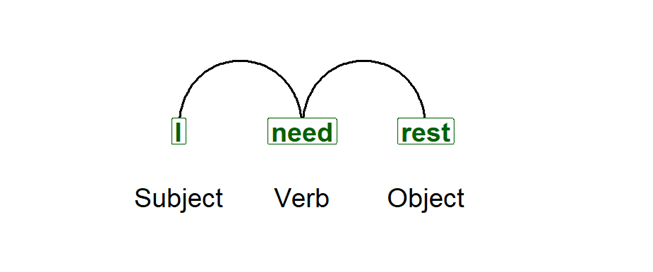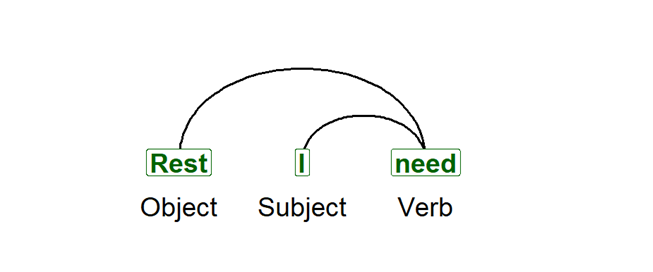Consider several examples:
– Rest I need.
– To his family, send him.
– Hard to see, the dark side is.
– Earned it, I have.
This word order has attracted the attention of many linguists. Here I want to convince you that it is deeply, truly alien.
Human language users tend to put related sentence elements as close as possible. By doing this, they make language processing more optimal (see here, here and here). Words in a sentence form dependency pairs, where one word is usually the head and the other one is the dependent. When the distances between them are short, our communication is more efficient because we don’t need to keep the uncompleted, unfinished dependencies in our memory for a long period of time.
Take a sentence, I need rest. The verb need is the head of the subject I (who needs?) and the head of the object rest (I need what?). We can visualize these dependencies as follows:

The length of the dependency between the subject I and the verb need is one word. The dependency between the verb need and the object rest is one word, too. The sum distance is thus 1 + 1 = 2 words.
Now take the same sentence in Yodish, Rest I need.

As in the standard version, the distance between the subject I and the verb need is one word. But the distance between the object rest and the verb need is now two words. The sum distance is 1 + 2 = 3 words. So, this sentence is more difficult to process than the sentence with the standard word order.
A quantitative investigation of several Star Wars scripts shows that the dependencies in Yodish are on average longer than in human English. Therefore, Yodish is more difficult to process for a human.
Another very alien feature of Yodish has to do with its highly variable word order. When Yoda speaks, the word order is sometimes strange, as in the sentences above. But sometimes the order is normal, for example:
– Master Obi-Wan has lost a planet.
– A Jedi’s strength flows from the Force.
The famous sentence May the Force be with you has the human word order, too. This switching from Yodish to English and back produces high variability. Sometimes the Subject is followed by the Object, as in standard English (I need rest), and sometimes it is the other way round (Rest I need). In fact, Yodish is in this respect similar to languages like Ancient Greek, Czech, Hungarian or Lithuanian. In these languages, both Subject + Object and Object + Subject occur frequently. So, high word order variability is not alien by itself. However, languages with high variability make extensive use of grammatical case, which helps the listener to understand who did what to whom. Take an example from Russian, which also has rich case marking:
Mash-a ljubit mam-u
Masha-SUBJECT loves mama-OBJECT
“Masha loves mama”.
Masha is in the nominative case, which is typical of subjects, and mama is in the accusative case typical of objects. With this case-marking, you can change the word order in any way you like; your addressee will understand you.
In contrast, languages without case marking like English or Mandarin Chinese rely on strict word order in order to make it clear who is the subject and who is the object. Like English, Yodish has no case marking. This combination of high word order variability and lack of case marking makes Yoda’s language really extra-terrestrial.
By the way, Dutch does not have cases worth mentioning, either. It also allows for some flexibility in the order of Subject and Object. Imagine your Dutch friend suddenly tells you, Kijk, dat is Brad Pitt! “Look, that’s Brad Pitt!”. She adds dreamily, Deze man wil elke vrouw ontmoeten. This sentence can be interpreted in two ways, “Every woman wants to meet this man” and “This man wants to meet every woman”. Is Dutch then alien, too? Not quite. If we take real Dutch texts, we will find that the position of the subject and object is much more fixed in comparison with texts in Ancient Greek, Czech, Hungarian and Lithuanian. Also, intonation helps us to interpret the sentence correctly. So the risk of confusion is lower than it may seem.
To sum up, Yoda’s creators have succeeded in making his language truly alien. So, if you want to create a language spoken in a Galaxy far, far away, and to be really convincing, don’t forget to make the language difficult to process for a human.
Read more
– Ferrer i Cancho, R. 2004. Euclidean distance between syntactically linked words. Physical Review E 70: 056135. Link
– Futrell, R., K. Mahowald, E. Gibson. 2015. Dependency length minimization in 37 languages. PNAS 112 (33): 10336-10341. Link
– Levshina, N. 2019. Universal Dependencies in a galaxy far, far away… What makes Yoda’s English truly alien. Proceedings of the Third Workshop on Universal Dependencies (UDW, SyntaxFest 2019), Paris, 35-45. Link
– Levshina, N. 2019. Token-based typology and word order entropy: A study based on Universal Dependencies. Linguistic Typology 23(3): 533–572. Link
– Liu, H. 2008. Dependency Distance as a Metric of Language Comprehension Difficulty. Journal of Cognitive Science 9(2): 159-191. Link
Writer: Natalia Levshina
Editor: Merel Wolf
Dutch translation: Dennis Joosen
German translation: Julia Misersky
Final editing: Merel Wolf

